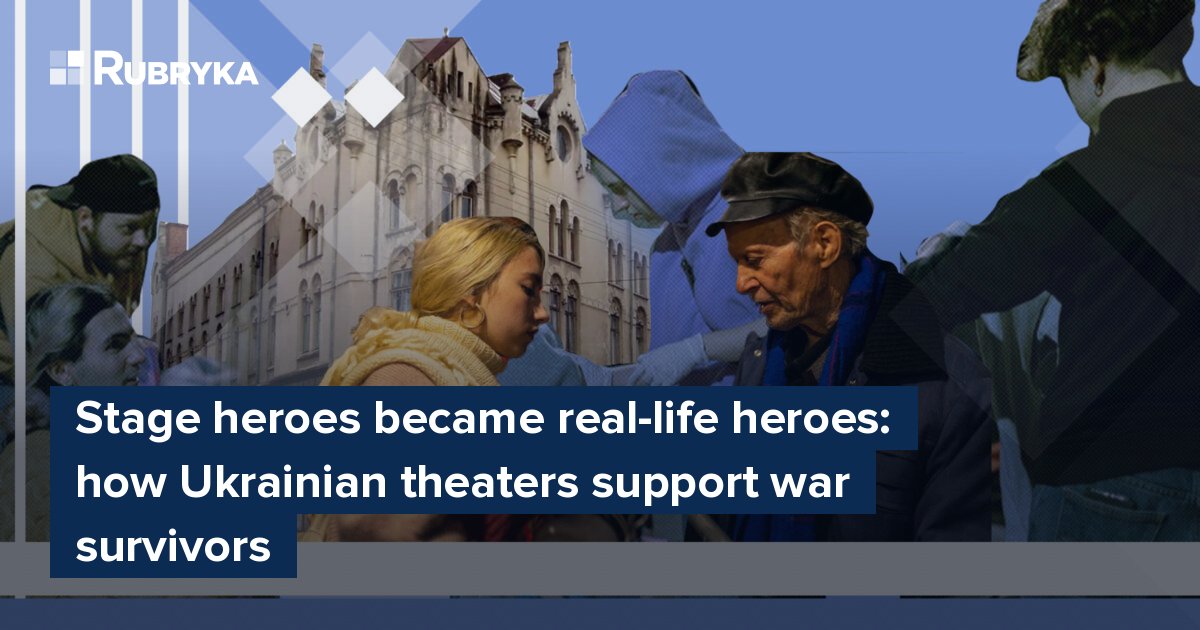
What is the problem?
According to a survey by the International Organization for Migration, the number of internally displaced persons (IDPs) in Ukraine is currently 6.9 million. In the very first days of the full-scale war, this number was many times larger: the flow of people poured from the north, east, and center of Ukraine to the west: someone went abroad, someone remained in Ukraine with the status of an IDP. Everyone needed help, support, and reassurance.
It was in that time that Ukrainians supported other Ukrainians the most. Humanitarian hubs, volunteer movements, aid centers, and shelters for displaced persons were created exceptionally quickly, and theaters joined in the movement of self-organization, since most of them already had experience volunteering to help people affected by the war that has been ongoing since 2014. In many cities, theaters have become not just places for cultural enrichment, but an oasis of of help from theater workers who are caring and quick to organize.
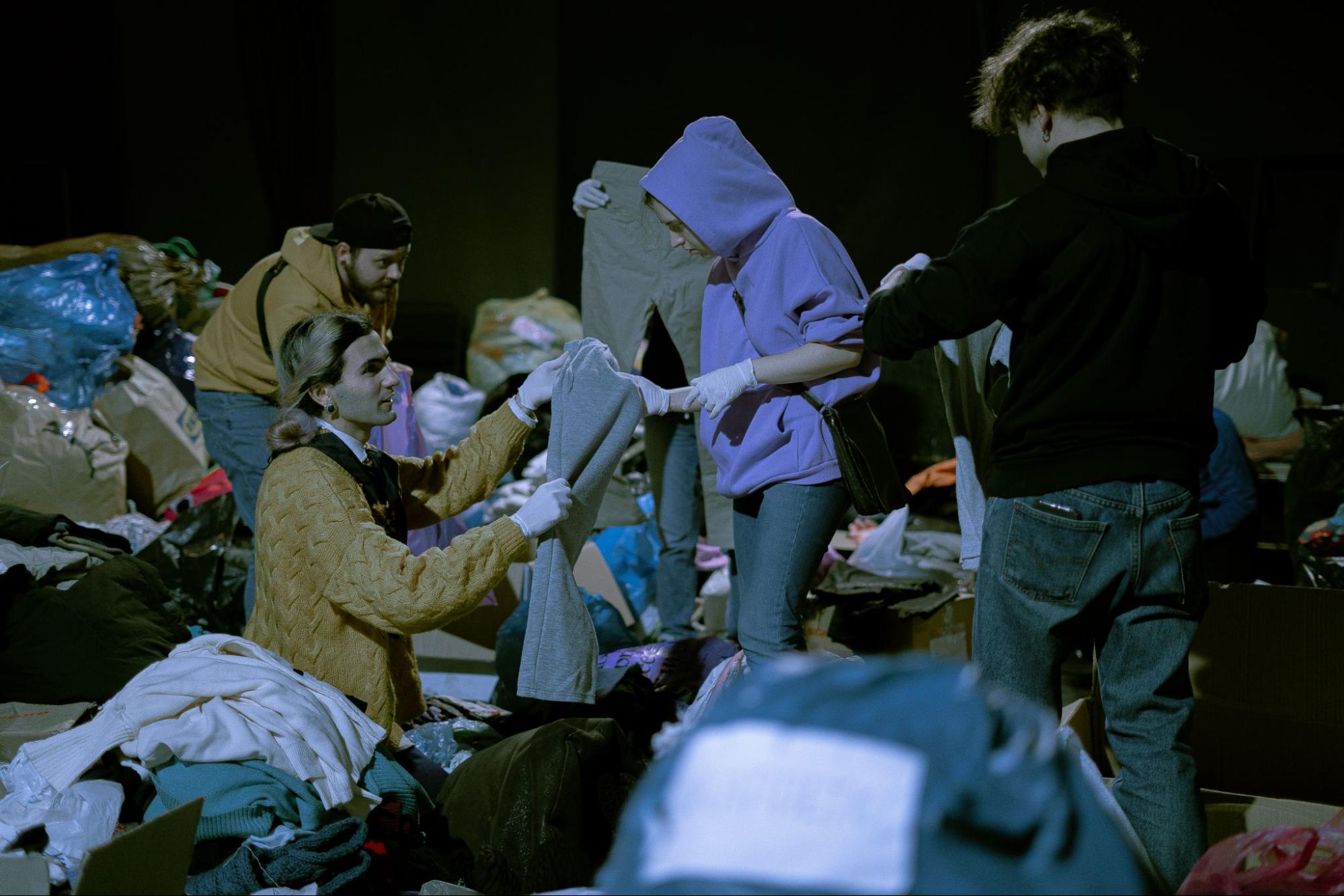
Lviv Lesia Ukrainka Drama Theater employees are sorting out humanitarian aid. Photo: Olha Klymuk
Rubryka visited the Lviv Academic Drama Theater named after Lesya Ukrainka — "Lesya's Theater" — as the staff affectionately call it, and the Poltava Academic Regional Puppet Theater. Their experience in the first months of full-scale war is almost identical, and so is their motivation.
What is the solution?
"On the eve of the full-scale invasion, on February 23, we gathered as a whole," recalls Iryna Chanyzh, chief administrator of the Lesya Ukrainka in Lviv, recalls. "We suspected a full-scale invasion was coming because everyone was watching the news and was feeling the mood. And although no one fully believed in it, we still decided to prepare. It was clear that many refugees would go to Lviv in the event of a full-scale attack by russia."
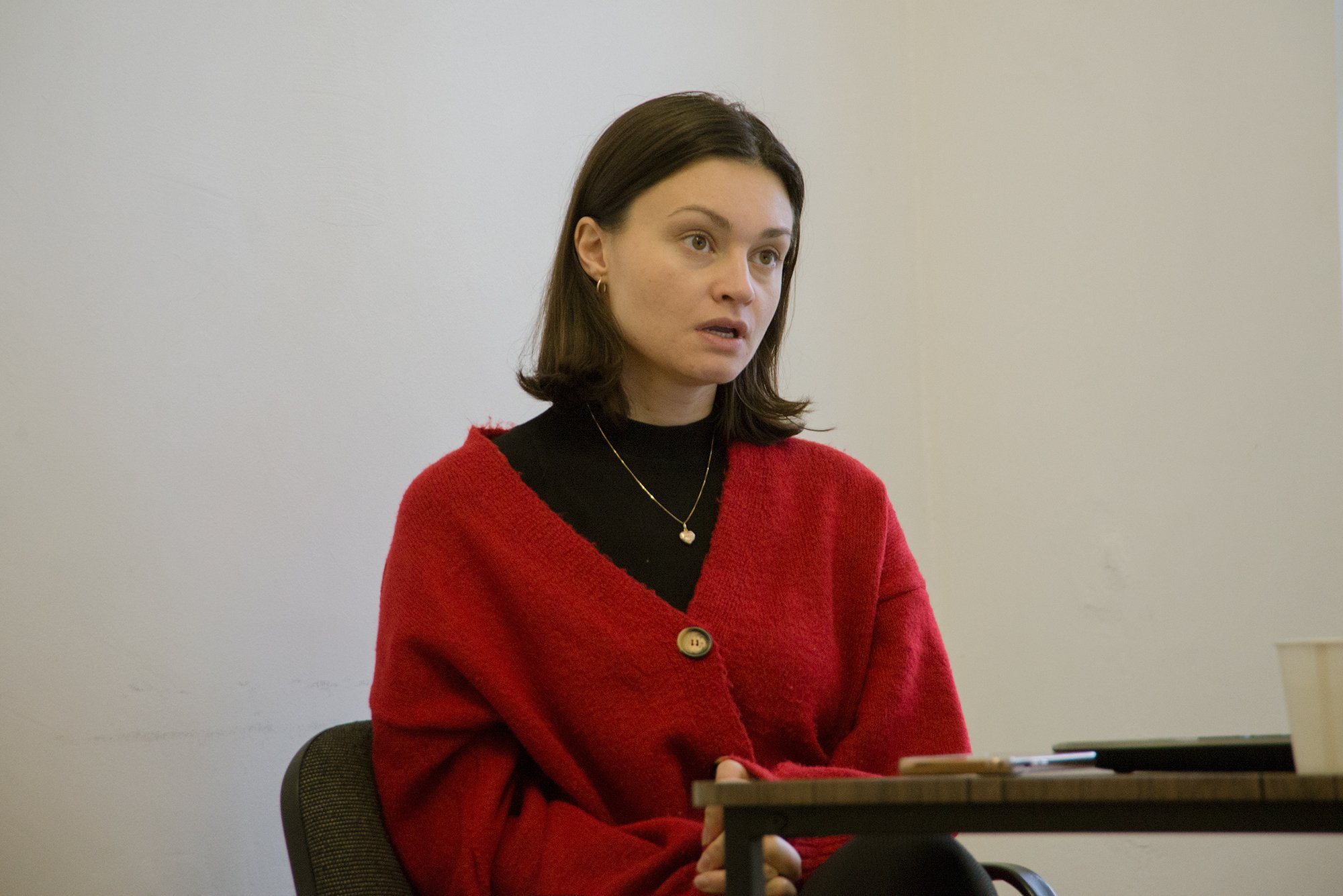
Iryna Chanyzh, chief administrator of the Lviv theater named after Lesya Ukrainka. Photo: Rubryka
Even before February 24, the employees of the Lviv theater thought about where the shelter for refugees would be located, bought necessities and water, and prepared the basements. Therefore, on the morning of February 24, they were shocked, but prepared.
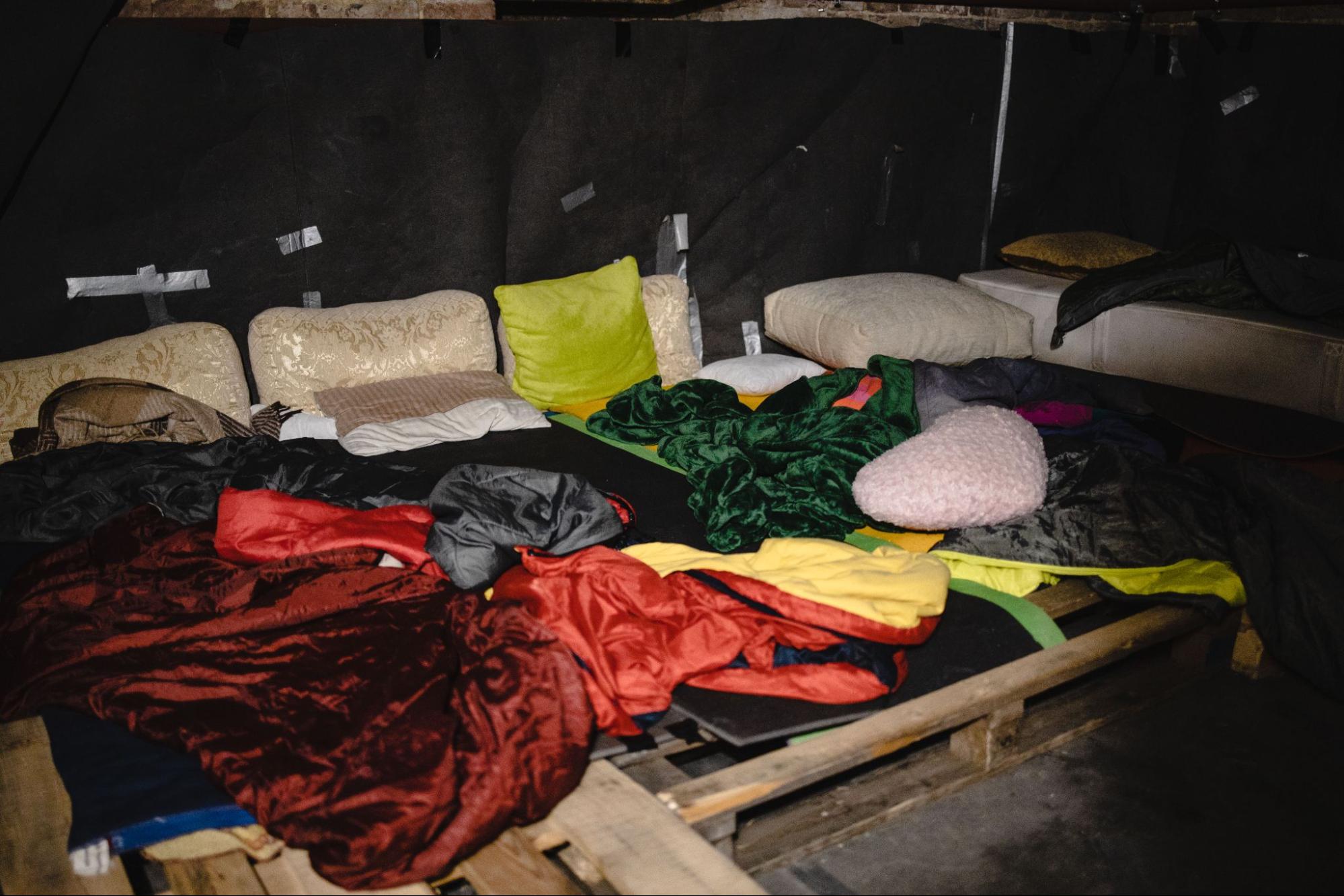
Arrangement of premises for displaced persons in the theater named after Lesya Ukrainka, Lviv. Photo: Bohdan Yemets
In the first days of invasion, a huge flow of people went from Kharkiv to Poltava. "We understood that we needed to help," says Tetyana Vitryak, director of the Poltava Academic Regional Puppet Theater. "People left everything behind — they came with a small suitcase at best. People needed to live somewhere, dress, and eat. Many of them were with children."
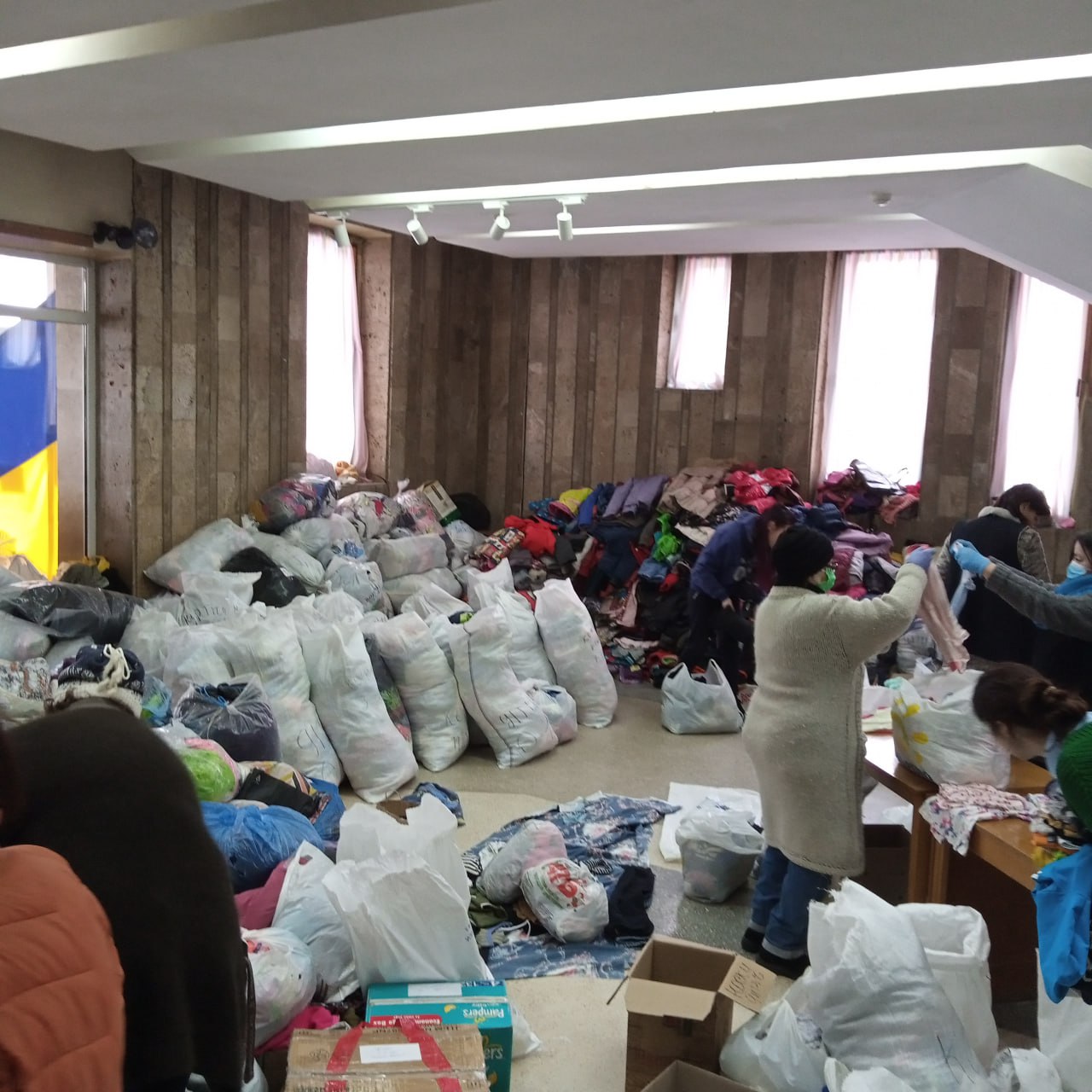
People collecting and sorting humanitarian aid in the Puppet Theater in Poltava. Photo from the archive of Tetyana Vitryak
So, on March 1, the theater transformed into a base of operations for volunteers. Through self-organization, the theater's employees were able to rapidly provide assistance to those who needed it. Regular performances came to a halt as theater workers focused on helping displaced people full-time. The types of work were very diverse, but everyone was ready to help to the best of their ability, some on the volunteer front, and others on the military front.
"On February 24, the first thing the male theater employees did was to go to the military commissariat," says Vitryak. "Four men from our employees have been called up for service, and now they are fighting for our independence."
How does it work?
Warm tea and radio "Alarm": how was life in the Lviv theater shelter?
At the beginning of the war, few people knew what to do and where to look for shelter. The local administration and social networks helped a lot in getting the word out about the shelter at the Lesya Ukrainka Theater. By reaching out through theatergoers and other volunteers, people learned that the theater was working to provide residents with everything they need.
On February 24, the first people who needed accommodation, warm tea, and food arrived. Some planned to go to Poland but had to stop somewhere to rest, according to Chanyzh. That is why the employees organized a shelter in one of the theater premises. They promptly looked for mattresses and blankets and arranged sleeping places.

The Lviv Theater named after Lesya Ukrainka. Photo: Bohdan Yemets
The shelter had a shower and a small kitchen set up in one of the dressing rooms. The audience also helped the theater workers — townspeople came to cook, brought and donated the necessary things. Foreign colleagues also helped by providing humanitarian aid and financial support. And so the theater shelter worked until the beginning of summer, when the need for temporary shelter became less critical.
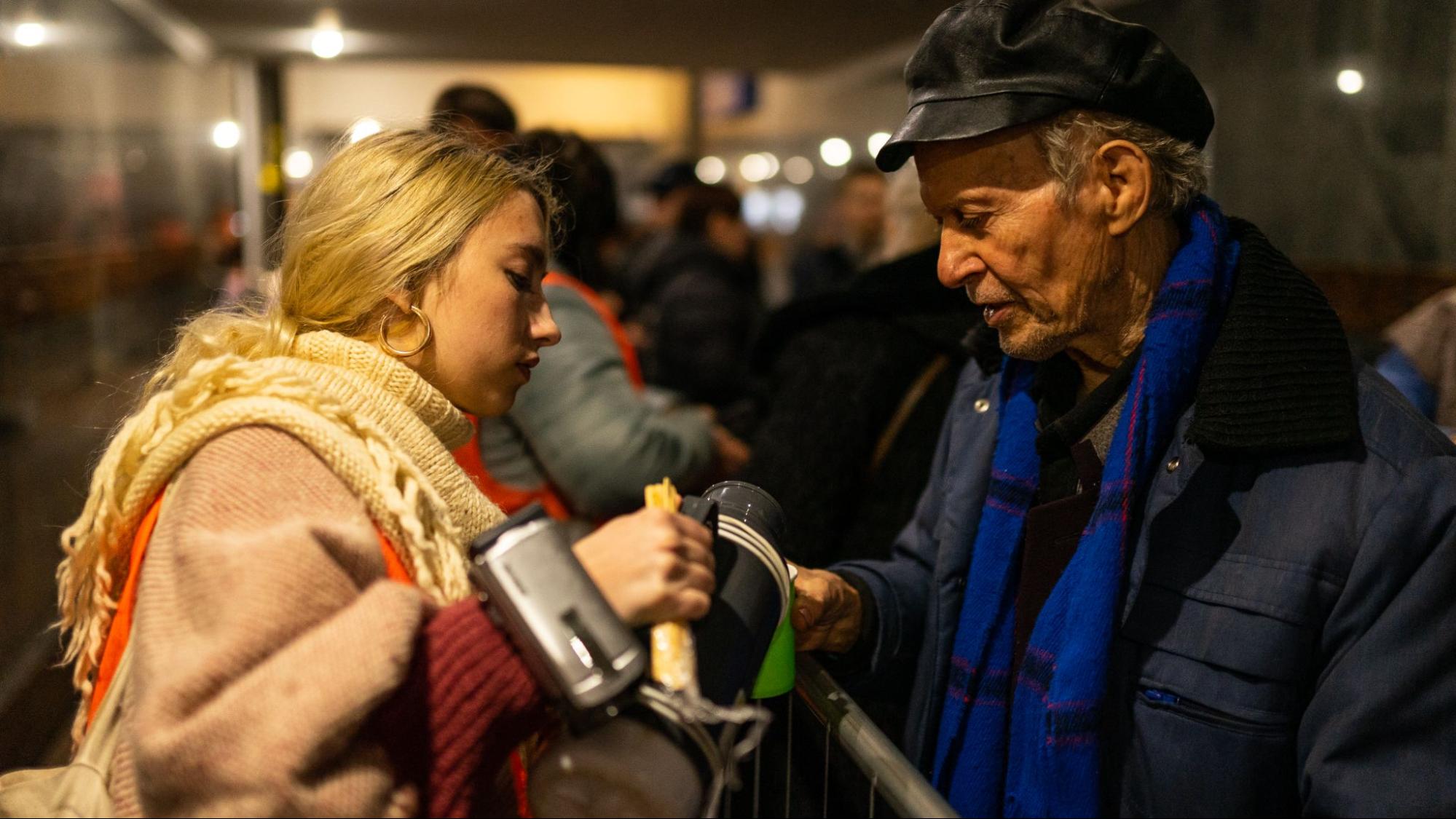
Residents meeting IDPs at the train station in Lviv. Photo: Orest Sklyaruk
"In general, about 300 people lived with us from the end of February to the beginning of June. Obviously, there was no such demand for this shelter in May-June, but in the first months, especially in March, we had a huge flow of people — some stayed for the whole three months, some for one day," recalls Chanyzh.
During air raids, the radio was an important source of information in the shelter of the Lviv theater. Almost the entire team was in the theater both day and night. Therefore, the artists needed to come up with ideas of how to entertain people in shelters during air raid alarms.
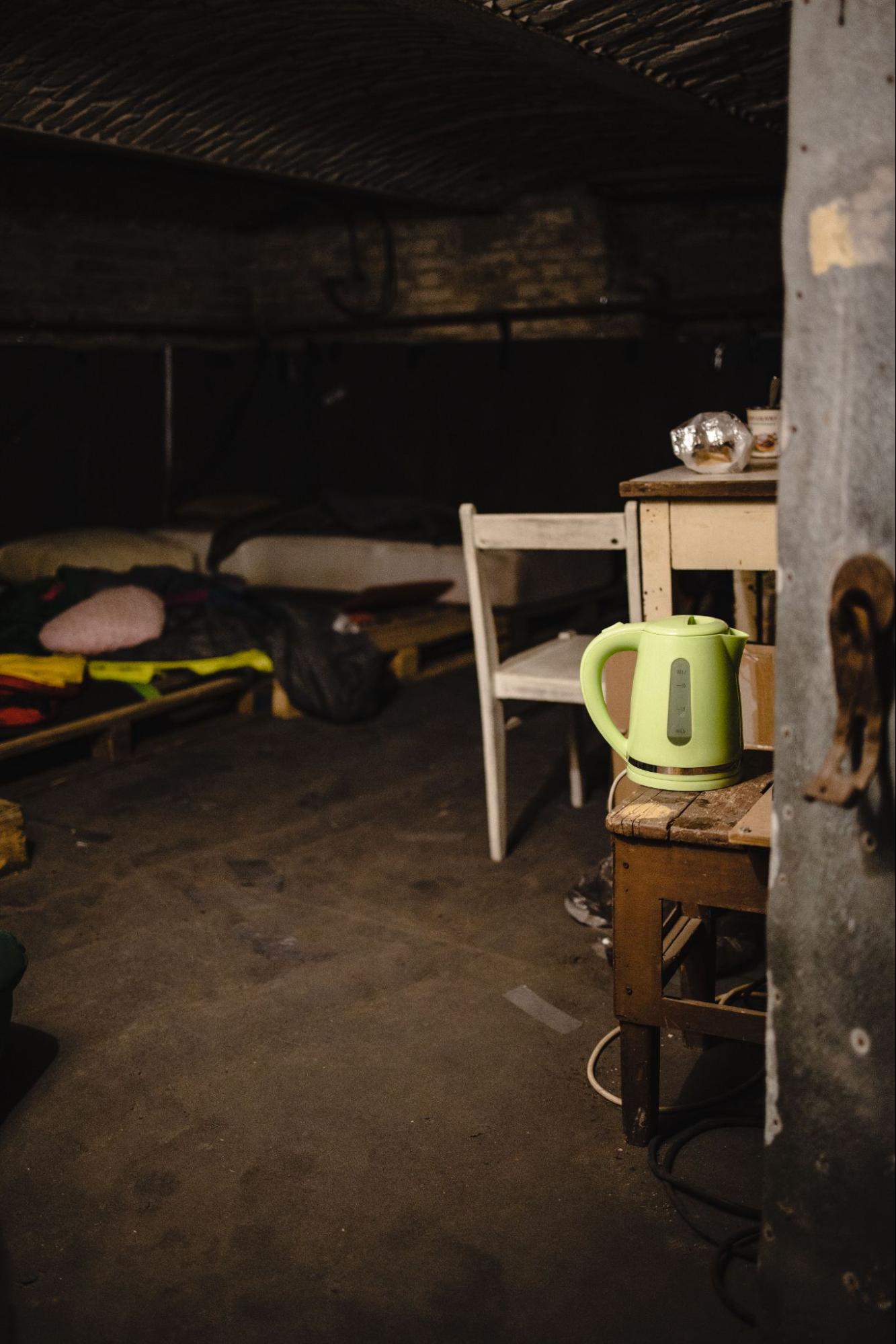
The bomb shelter in the Lviv theater. Photo: Bohdan Yemets
"We talked about various topics to have a little fun and entertain our viewers. And then the radio "Alarm" grew into the idea of holding auctions occasionally — selling props from performances, scenery, even meeting with actors, actresses, directors. The collected funds were also sent to help," the administrator told Rubryka.
Theater humanitarian headquarters
A huge number of displaced persons needed shelter and humanitarian aid when russia invaded, causing thousands to flee cities in eastern and central Ukraine. Most of them barely had time to grab their documents and necessities. Some people simply had nowhere to get warm clothes and hygiene items, and the workers of the puppet theater in Poltava also understood this. Tetyana Vitryak says that the flow of people was massive, and the needs were innumerable. It was especially difficult for people with small children. The theater immediately contacted all the local volunteer organizations, foundations, and entrepreneurs they could to try and organize help.
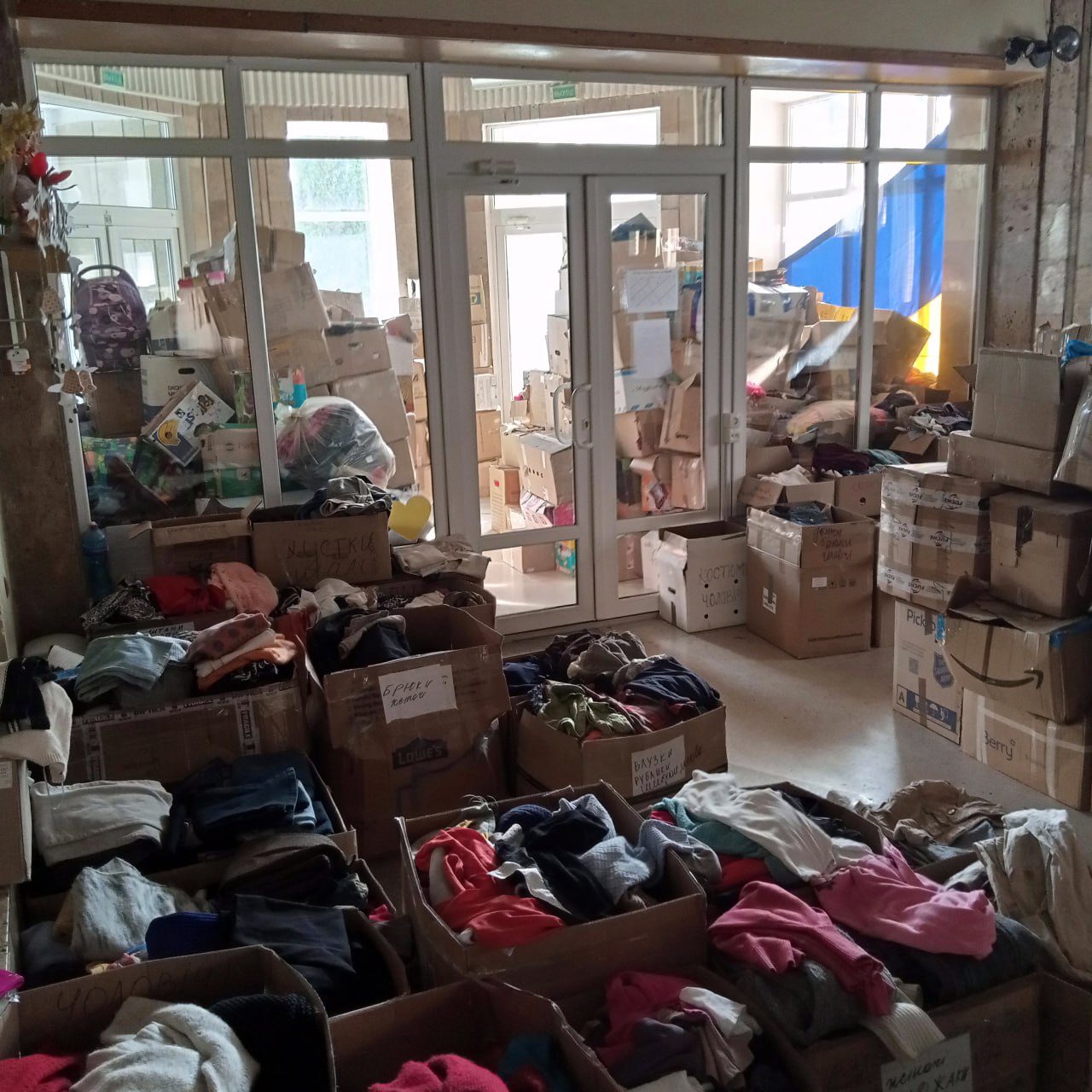
A pile of humanitarian aid in the Poltava theater hall. Photo from the archive of Tetyana Vitryak
When the theater put the down out that Poltava residents could send donations with the help of a courier service, donations started to pour in, from bed linen, towels, and clothes to food and hygiene products. "There was so much that the theater's premises could no longer accommodate this aid," says Vitryak.
Many donations were transferred to the military headquarters and the region's communities. Later, the puppet theater's efforts were mainly directed at providing for the needs of families with children. "As a rule, families with many children came, and everyone needed help," says Vitryak.
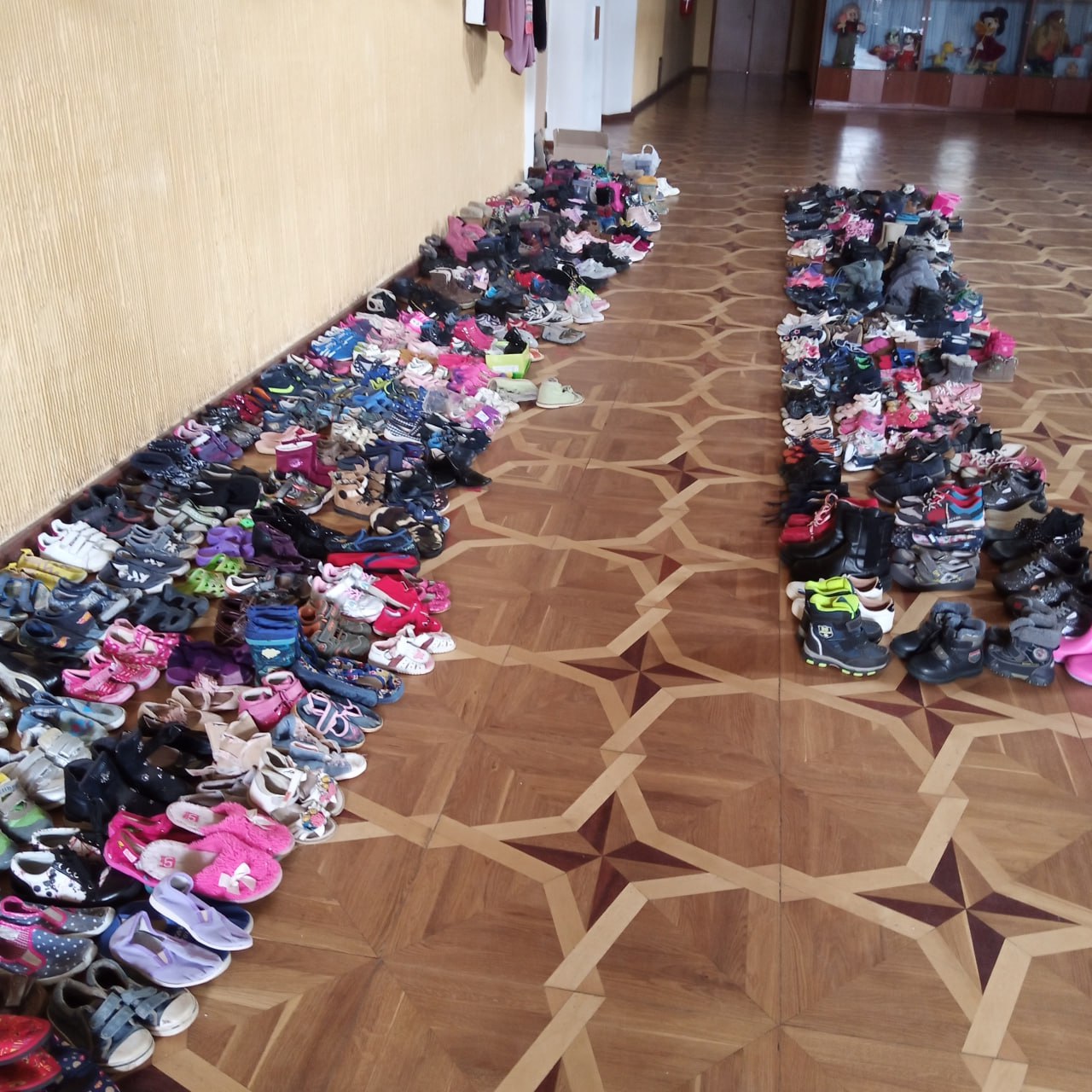
A pile of shoes for IDP children in Poltava theatre hall. Photo from the archive of Tetyana Vitryak
Once, volunteers of the Poltava theater put together a package for the first time for a woman from Kharkiv with a newborn baby, including a bath, a crib, a stroller, and clothes. And after some time, she washed the clothes and brought them back, asking: "We grew out of the clothes, so I brought them back. Can we take a larger size and give these to someone else?"
"There were many such stories," says the director. "It was very nice that our help does not go to the trash, and people are so responsible about our work."
Even more useful solutions!
Assistance to the military: at the front and in the rear
The Lviv theater's volunteer activities did not stop with helping the civilian population. After the shelter was no longer needed, the theater workers switched to another type of activity because everyone understood that they couldn't stop.
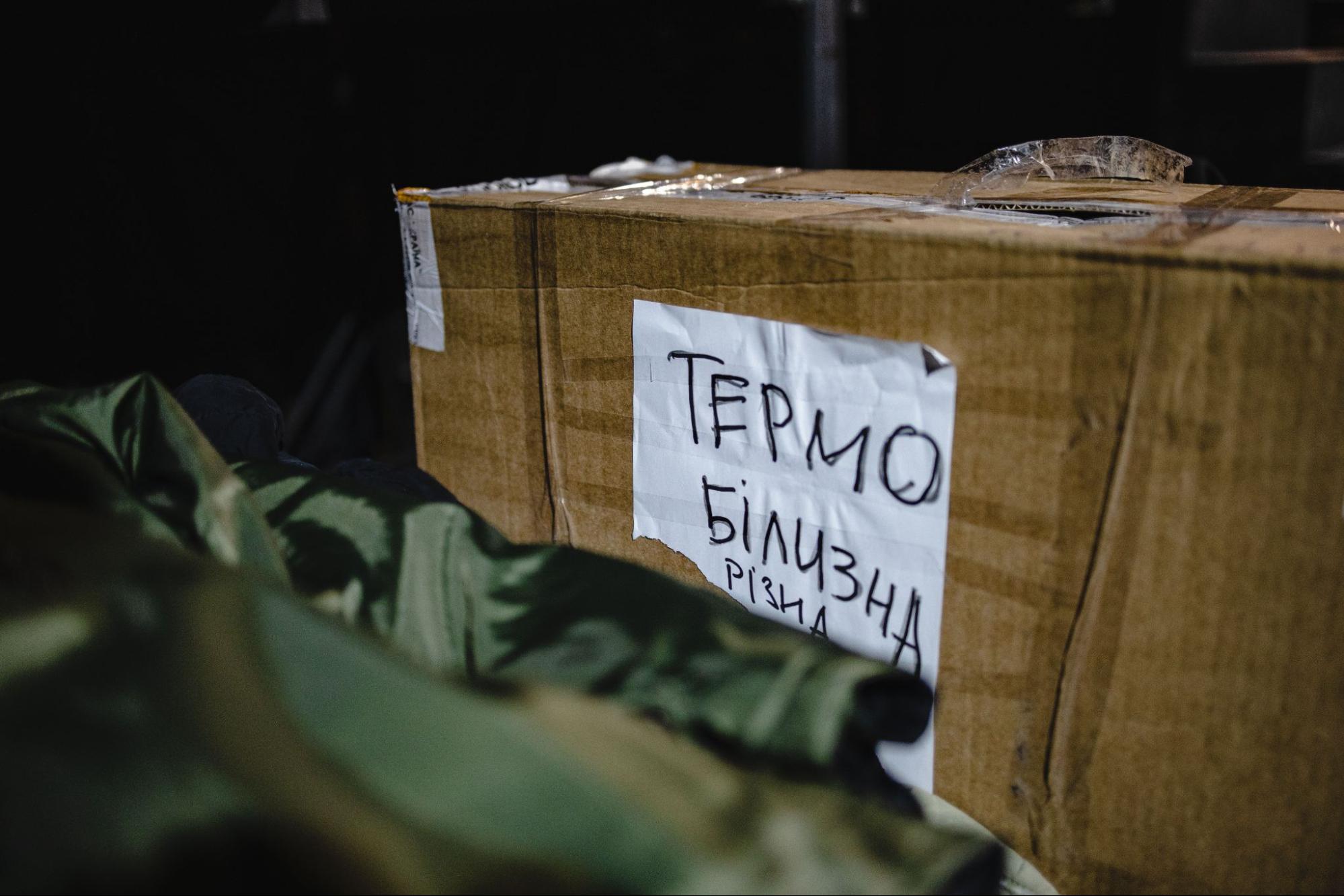
A box with thermal underwear in the Lviv theatre. Photo: Bohdan Yemets
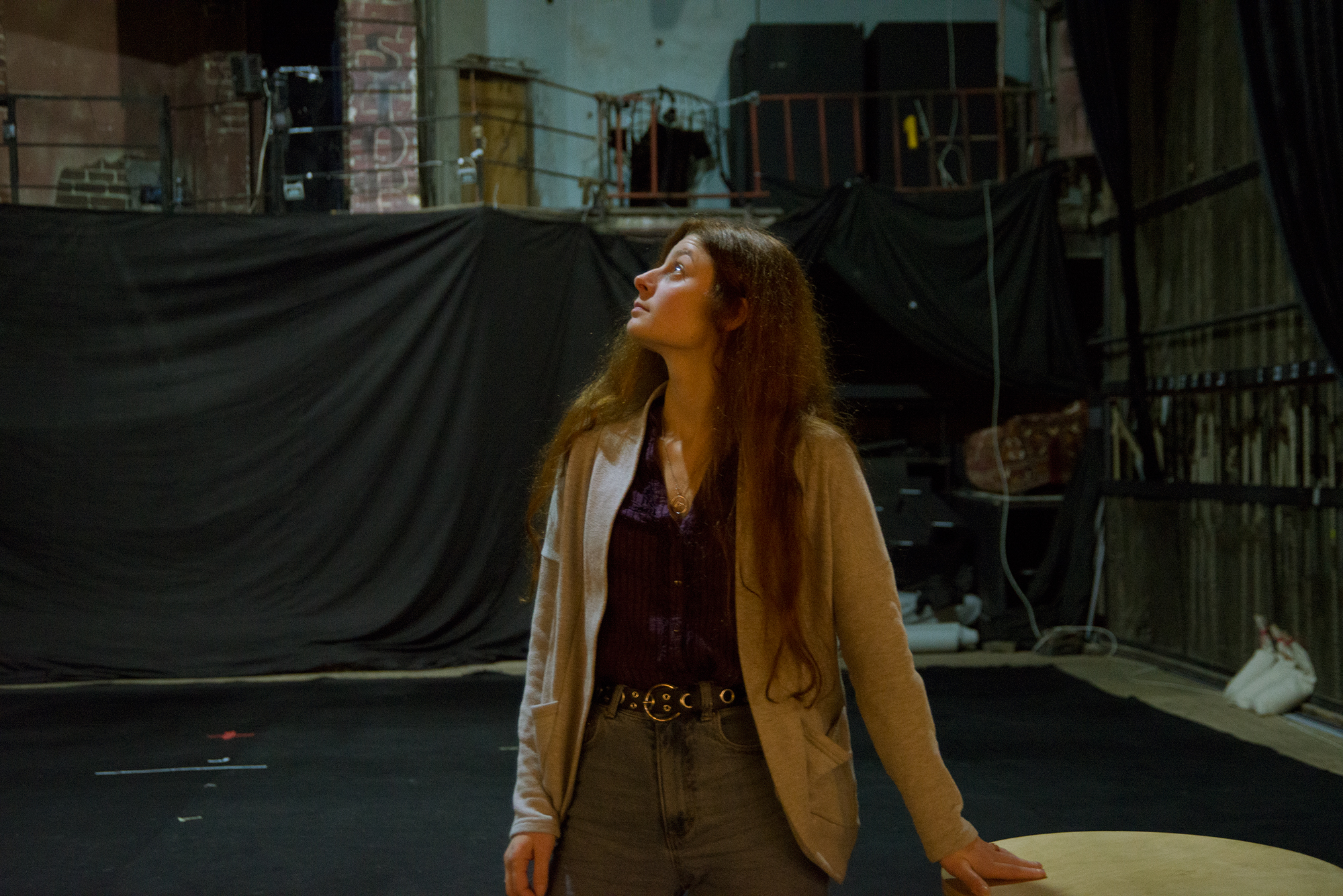
Svitlana Ilyuk, director and assistant director. Photo: Rubryka
Employees of the Lviv theater continue to be involved in fundraisers by the audience, as well as public acquaintances, who spread information about collections on their social media.
Another ongoing area of work is visiting wounded soldiers in hospitals. This initiative began with simply the desire to thank them for their hard work, and later transformed into a kind of therapy. Although fulfilling patients' requests and providing for their physical needs is important, maintaining a healthy psychological state, especially in the conditions of war, is also essential.
"I don't want to stop," says Ilyuk. "I understand that I have to give tribute to these people. Many of them were left without limbs and had severe injuries and contusions. And for now, we will not stop visiting hospitals. They need such support."
"The show must go on"
Despite their new calling, volunteering did not prevent these theater actors from continuing to pursue their careers on stage, both in Ukraine and in Europe.
"For the first three months, we didn't function as a theater — only as a volunteer shelter for displaced persons. In general, it was strange to put on plays because smiling and having to be in character is traumatic for the actors when there is a war in the country. But gradually, there was an understanding that the theater is still needed and should exist even in such tough times," says Dmytro Zahozhenko, chief director of the Lesya Ukrainka Theater.
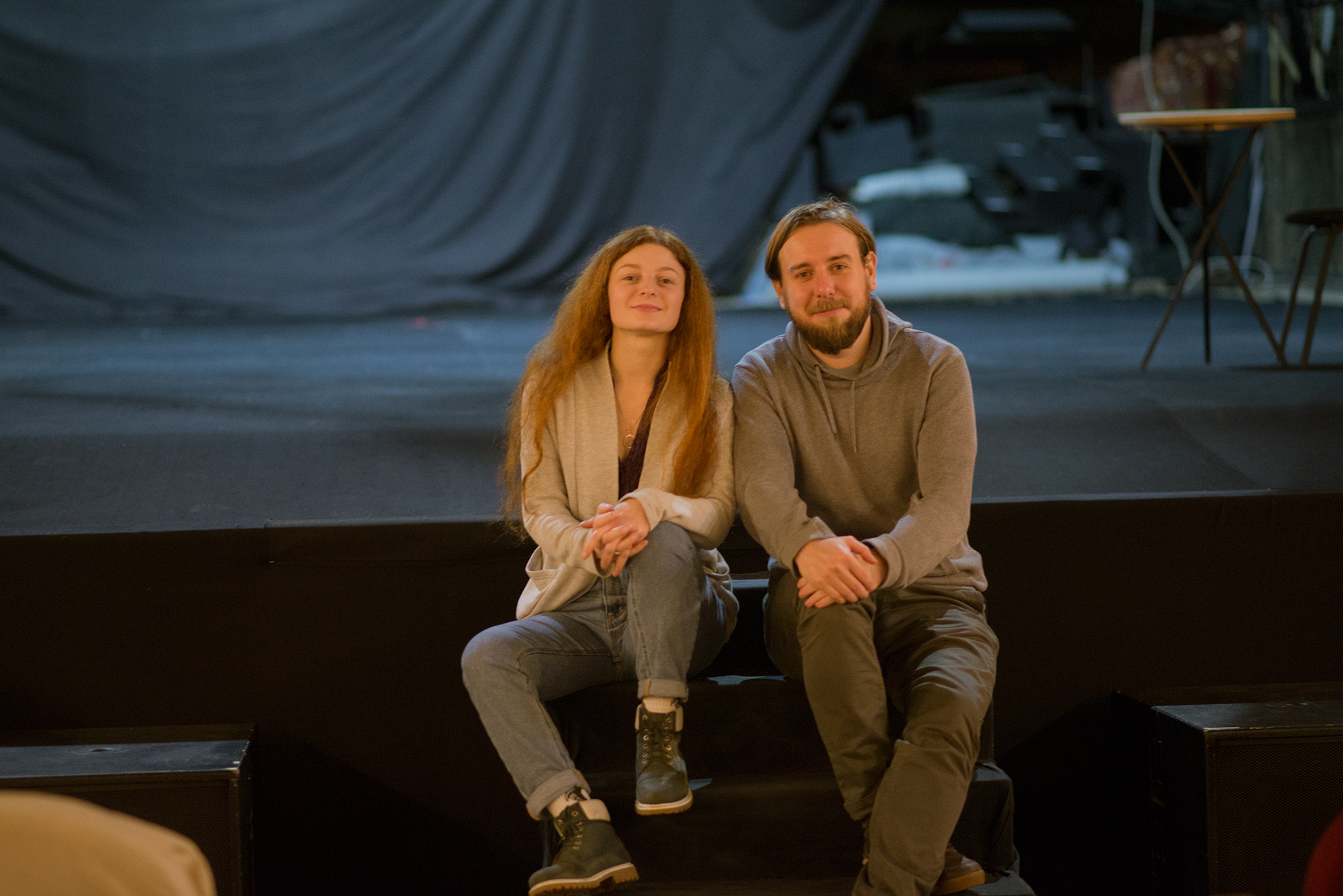
Svitlana Ilyuk and the chief director of the Lviv theater Dmytro Zahozhenko. Photo: Rubryka
While Ukrainian soldiers were fighting the enemy at the front, directors and actors were defeating another enemy, less visible but also dangerous: misunderstanding of Ukraine's tragedy of war among the Western public.
The first performance of the Lesya Ukrainka Theater "Imperium Delendum Est" – Latin for "the empire must fall" – which was already written during the time of full-scale invasion, was a hit among European audiences at the Avignon Festival in France in the summer of 2022.
According to Zahozhenko, the performance was staged only within the framework of the festival, and the audience was not ready for the level of frankness and emotions that were portrayed on stage.
"This war, which is taking place thousands of kilometers away, in fact, does not directly concern you — I am talking about the French audience. And suddenly, it is here, nearby, at arm's length. And you can no longer ignore it. When this experience is so close, and living people transport you into their reality, it works very strongly," the director says about the experience of the foreign audience.
After that, there was a tour of France — the actors took part in several more festivals with the same performance, which was later staged in Lviv. The Lesya Ukrainka Theater resumed activity after the shelter's closure. According to Zahozhenko, classics are usually popular, but "Imperium Delendum Est" is seeing success because of its contemporary relevance.
"It is impossible to escape from the topic of war and its horrors. It is necessary to return to it despite everything. We will play this piece until the day russia signs the capitulation. On the day of signing, we will write it off," the director told Rubryka.
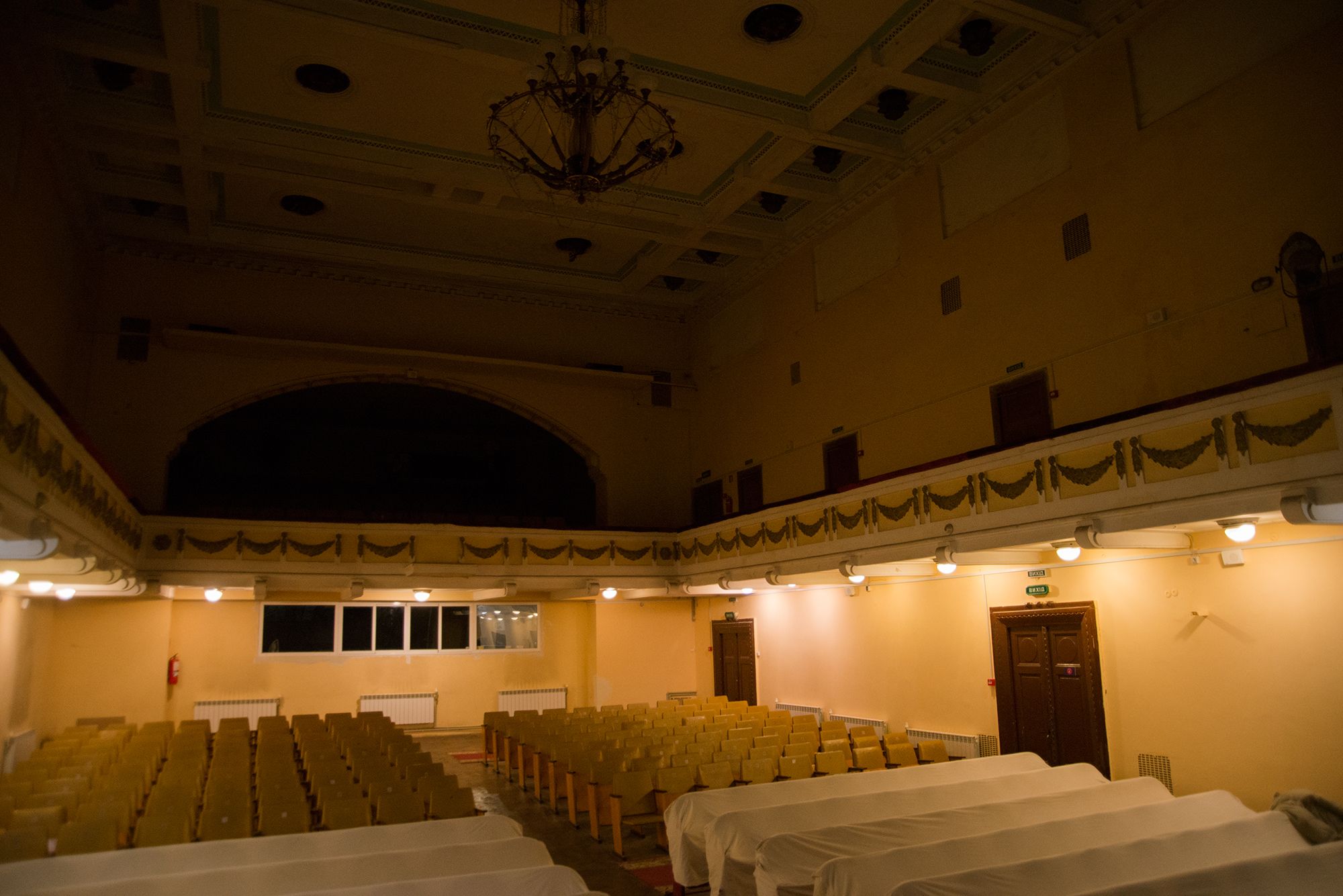
Photo: Rubryka
Actors of the puppet theater in Poltava have continued to work to bring joy to their main audience — children. Despite the temporary halt to performances in the theater building, in 2022, the Poltava Puppet Theater still gave about 500 performances, most of them outside the premises. After October 2022, the theater continued its work already on a stationary basis, giving two performances a day, because – as Vitryak says – "the show must go on."
This material was created by the online media outlet Rubryka within the framework of the "Ukrainian Rapid Response Fund" program, implemented by IREX, with the support of the US State Department. The content is the sole responsibility of the Rubryka online media outlet and does not necessarily reflect the views of IREX or the US State Department.




